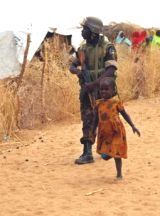Darfur force has unprecedented preacekeeping mission
August 27, 2007 (WASHINGTON) — A hybrid U.N.-African Union peacekeeping force for the Darfur region of Sudan has received sufficient pledges for participation, though critical needs remain for technical support and an engineer corps, a top U.N. official said.
 “It is unprecedented what we are trying to do here,” Jane Holl Lute, the U.N. assistant secretary general for peacekeeping operations, said about the coordination between the African Union and the United Nations.
“It is unprecedented what we are trying to do here,” Jane Holl Lute, the U.N. assistant secretary general for peacekeeping operations, said about the coordination between the African Union and the United Nations.
But “the political process is the heart of the peacekeeping mission. It can only walk alongside the process, not substitute it,” she said.
Lute, an American, said the headquarters for the 31,000-member force would be operational in El Fasher, capital of North Darfur state, by the first week of October.
The Darfur conflict began in 2003, when the Sudanese government responded to a rebellion with indiscriminate killings and by unleashing militias, human rights groups say. As many as 450,000 people have died from violence and disease and 2.5 million have fled their homes, international experts say.
Sudan recently agreed to the deployment of a joint U.N.-A.U. peacekeeping entity, which will absorb a 7,000-member A.U. force that has failed to stop the violence. Lute is in charge of getting the force on the ground by the end of the year.
Lute, who traveled to Darfur in July, cited enormous operational challenges. The desert terrain is daunting, and sandstorms are frequent. El Fasher is 125 miles from the nearest port, which means massive equipment will have to be transported overland. Roads must be built. Commercial companies will handle the construction of camp sites and the foundations for water and fuel storage, she said.
Roving bands operate in the vast, lawless areas of Darfur. “Our mission is critical for the delivery of humanitarian assistance. Even among these opportunists, these are people who want to kill, not who want to die. When they see a supreme force come in, they will find an alternative path,” she said.
On the positive side, Lute said, supplies blocked at the harbor in Khartoum have been released for unloading. “Things have been flowing more smoothly than they have been in the past. Hundreds of containers caught up in the port of Khartoum have started to move since July,” she said.
Most of the participants in the force will come from African countries. Other countries, including India, Bangladesh and Nepal, are contributing logistical units, and China is providing engineering units. About 19,500 soldiers will be armed.
Lute estimated that the annual cost of the force would be $2.4 billion to $2.6 billion. The United States is to fund about a quarter of the costs. Lute spoke in Washington, where she met Friday with officials at the National Security Council before returning to New York.
Peacekeepers serving in the many U.N. missions around the world have been accused of misconduct, including sexual abuse. Lute said she was “focused on the fact that the United Nations has been under scrutiny for misbehavior of its troops. We are being held to the highest standards, and we do have soldiers who behave badly.”
Before deploying to Darfur, the peacekeepers will participate in special training programs to prevent such incidents and for maintaining a disciplined and orderly force, she said.
The forces will also be trained to deal with the “outrageous acts of sexual violence” by militias against women who venture outside displacement camps to collect firewood.
“Rape is a weapon of war, and it is used for intimidation and subjugation. We are working on a victims’ assistance policy and strategy,” she said. “Peacekeepers have to soldier their way back to zero tolerance of such acts.”
(Washington Post)
